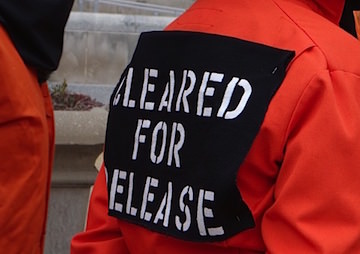Guantanamo’s Ex-Detainees Find Little Solace in Uruguay
Release from the Guantanamo Bay prison to the South American country has not amounted to freedom for many of the men whom the U.S. government previously regarded as “high threat” members of al-Qaida’s global terrorist network.
Release from the Guantanamo Bay prison to the South American country of Uruguay has not amounted to freedom for many of the men whom the U.S. government previously regarded as “high threat” members of al-Qaida’s global terrorist network.
The Washington Post reports:
While free — in theory — to leave Uruguay, the men do not yet have passports. [Jihad Ahmed Mustafa] Dhiab hardly ever goes outside now. He feels the promises made to him have been betrayed. He wants his own house, his family brought from Syria, enough money to live with dignity and start a business. He demands that the United States own up to its responsibility for having imprisoned him without charge for more than a decade, finally releasing him with a letter from the State Department saying there was no information he or any of the other men had any role in “conducting or facilitating terrorist activities.”
And so, Dhiab has returned to exercising the one right he had in Guantanamo: to refuse. He no longer accepts the $600-per-month stipend from the Uruguayan government. He has stopped having regular hospital visits despite a long list of health troubles. He has no income, phone or job prospects. He predicts the tomatoes, cucumbers and potatoes he nibbles might last a couple more weeks, and when they’re gone, he has a plan.
“When it’s finished, I’ll start the hunger strike,” he said. “I’ll go sit down in front of the U.S. Embassy.”
Jihad Dhiab may be out of prison. But he is not yet free.
Read more here.
— Posted by Alexander Reed Kelly.
Independent journalism is under threat and overshadowed by heavily funded mainstream media.
You can help level the playing field. Become a member.
Your tax-deductible contribution keeps us digging beneath the headlines to give you thought-provoking, investigative reporting and analysis that unearths what's really happening- without compromise.
Give today to support our courageous, independent journalists.






You need to be a supporter to comment.
There are currently no responses to this article.
Be the first to respond.